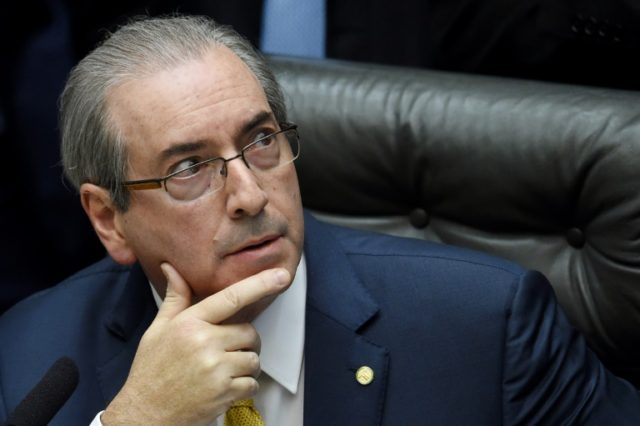Brazil’s Supreme Court has suspended the mandate of Eduardo Cunha, the president of the lower chamber of Congress, indefinitely. Cunha was the force behind organizing a push in the House of Representatives to impeach President Dilma Rousseff.
Cunha will remain suspended indefinitely from acting as the House President after a unanimous vote that took less than 24 hours, a rarity for the court. The court cited ongoing corruption investigations against Cunha as their reason for suspending him. In March, the court agreed to allow a case to go through against Cunha after prosecutors found evidence that he had taken up to $5 million in bribes, the findings part of an investigation known nationwide as “Operation Car Wash.”
Operation Car Wash investigators have found a web of dozens of high-ranking politicians involved in a kickback scheme which used Petrobras, the nation’s state-run oil corporation, to launder dirty money, solicit bribes, and grant development contracts to friends of the government.
Justice Celso de Mello accused Cunha in participating in a scheme to “entrap government organizations through a criminal organization,” that government organization being Petrobras.
President Rousseff, of the socialist Workers’ Party (PT), responded to the news by calling Cunha — a member of the rival leftist Brazilian Democratic Movement Party (PMDB) — a “person devoid of moral principles and ethics, accused of money laundering and [hiding money in] offshore accounts.” Rousseff called Cunha’s organizational efforts to get an impeachment vote through the House a “violent” act and a “coup.”
Cunha has called the decision a “political” one and his newfound situation “strange and challenging.” He has vowed to appeal the case. “I will not give up, there is no chance, I will not renounce anything, neither the mandate nor the presidency, and I will appeal and I hope to succeed in my appeal,” he told reporters.
Privately, however, sources close to Cunha tell Brazilian newspaper O Globo that he is “upset” and “broken,” mulling a decision on whether to stay in Brazilian or spend some time with his family in Rio de Janeiro. “Eduardo is very worried, upset,” one anonymous source told the newspaper. “I do not know what I will do now. I do not know if I stay here or go to Rio. I can not get to and fro. I need to take care of my family,” the source quotes him as saying.
While the move to impeach Rouseff is significantly popular in Brazil, public opinion appears to have soured against all leftist politicians, not just the head of state. A poll released in April found that residents of Sao Paulo overwhelmingly supported impeaching Vice President Michel Temer, also of the PMDB, and 94 percent of respondents said they would like to see Cunha removed.
Some on the right are expressing concern, however, with the manner in which Cunha has been removed. Rodrigo Constantino, a right-wing blogger labeled “the Andrew Breitbart of Brazil” by Foreign Policy magazine, has compiled a list of political observers challenging the constitutionality of the judiciary stepping in and dispossessing a legislator of his power. He himself writes that “the manner in which it was done shows a disregard for the constitution.” While many are pleased to see a corrupt politician out of power, he writes, “few – very few – take into account the dangerous precedent that such a decision, without the constitutional backing legal scholars would want, represents.”
The Supreme Court is the only court in the nation with the power to try individuals granted immunity through holding public office. It appears poised to exercise its power soon not only over Cunha, but over Rousseff herself and her predecessor, Luiz Inácio Lula da Silva.
The court has accepted to entertain a formal request from the nation’s Prosecutor General to open a corruption investigation against Lula, currently immune through a position as Rousseff’s chief of staff, and Rousseff herself, as well as Attorney General José Eduardo Cardozo. The prosecutor general alleges there is evidence that Rousseff appointed Lula her chief of staff to keep federal courts from investigating his ties into the Operation Car Wash scheme.
Meanwhile, the march toward impeachment continues. A bill to impeach Rousseff is currently in debate at the Brazilian Senate; a vote on the bill is expected on Friday.

COMMENTS
Please let us know if you're having issues with commenting.